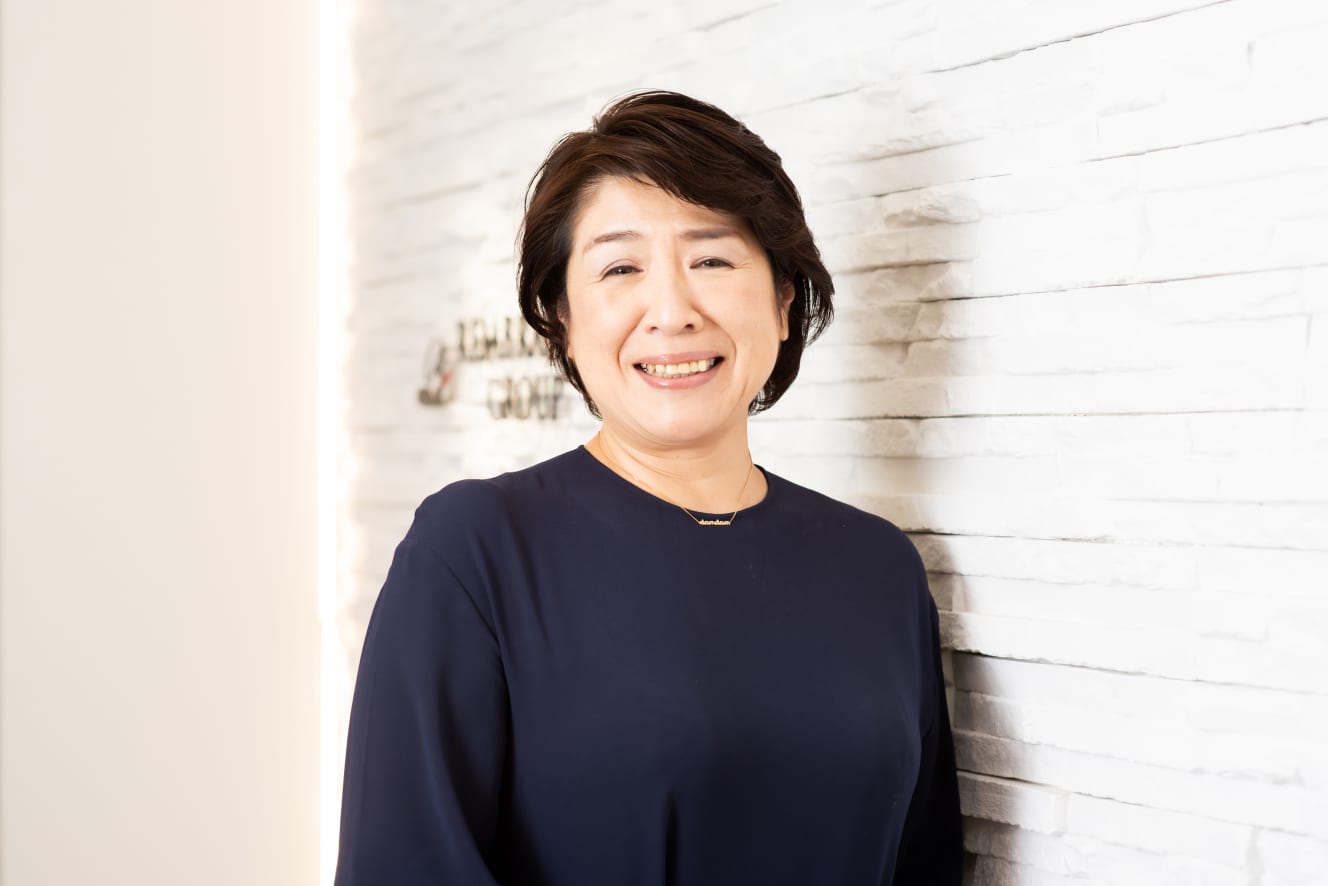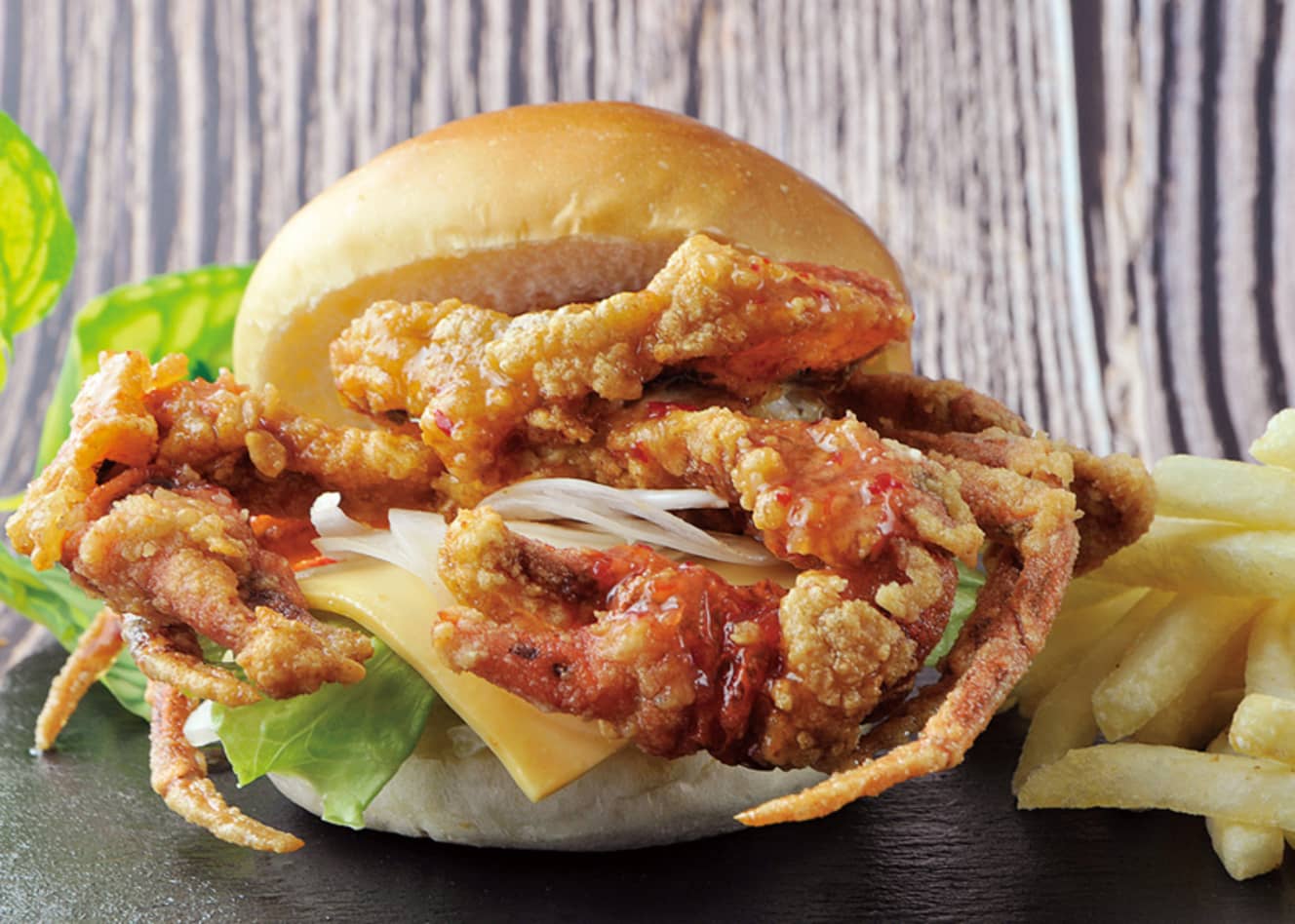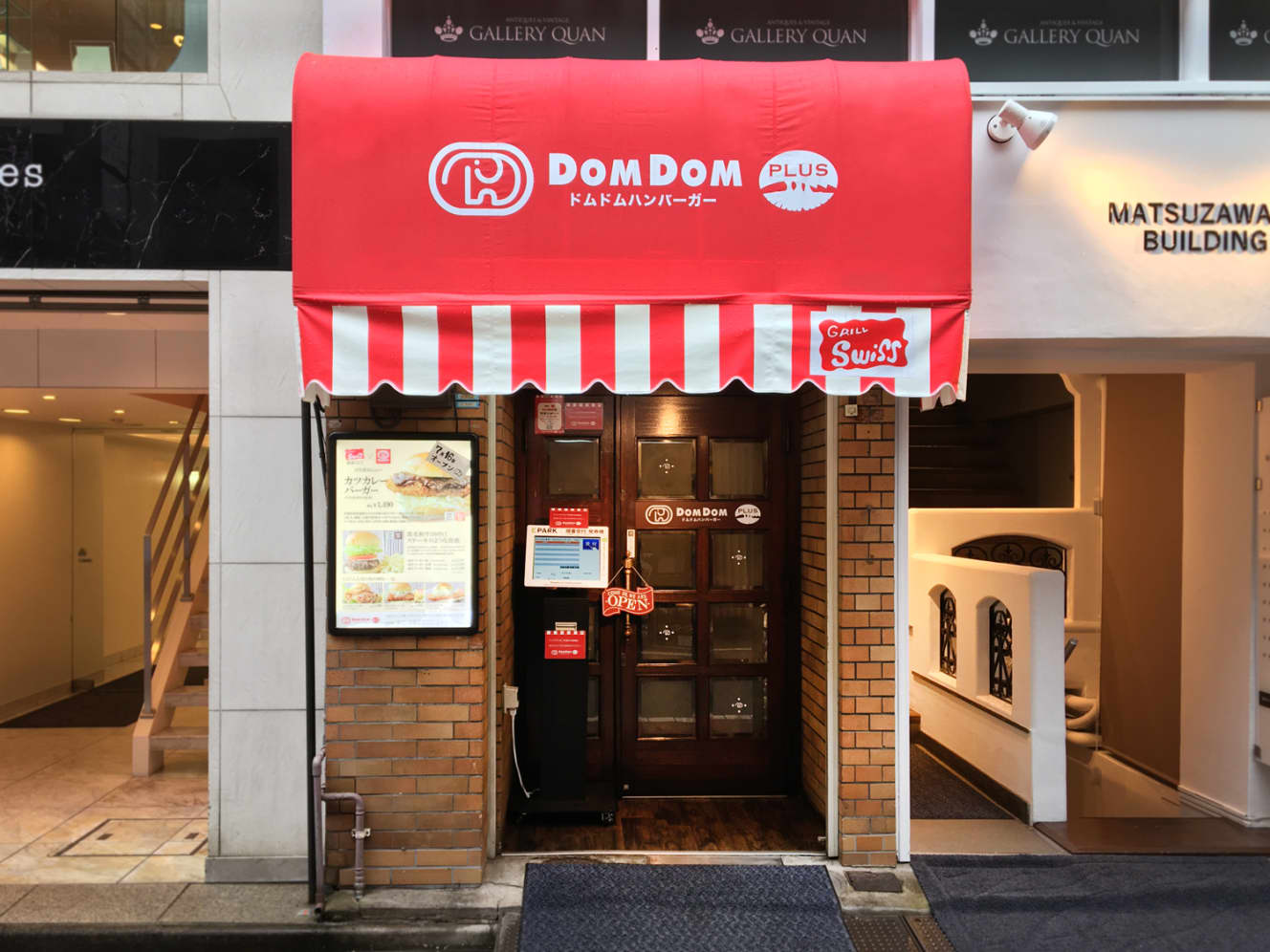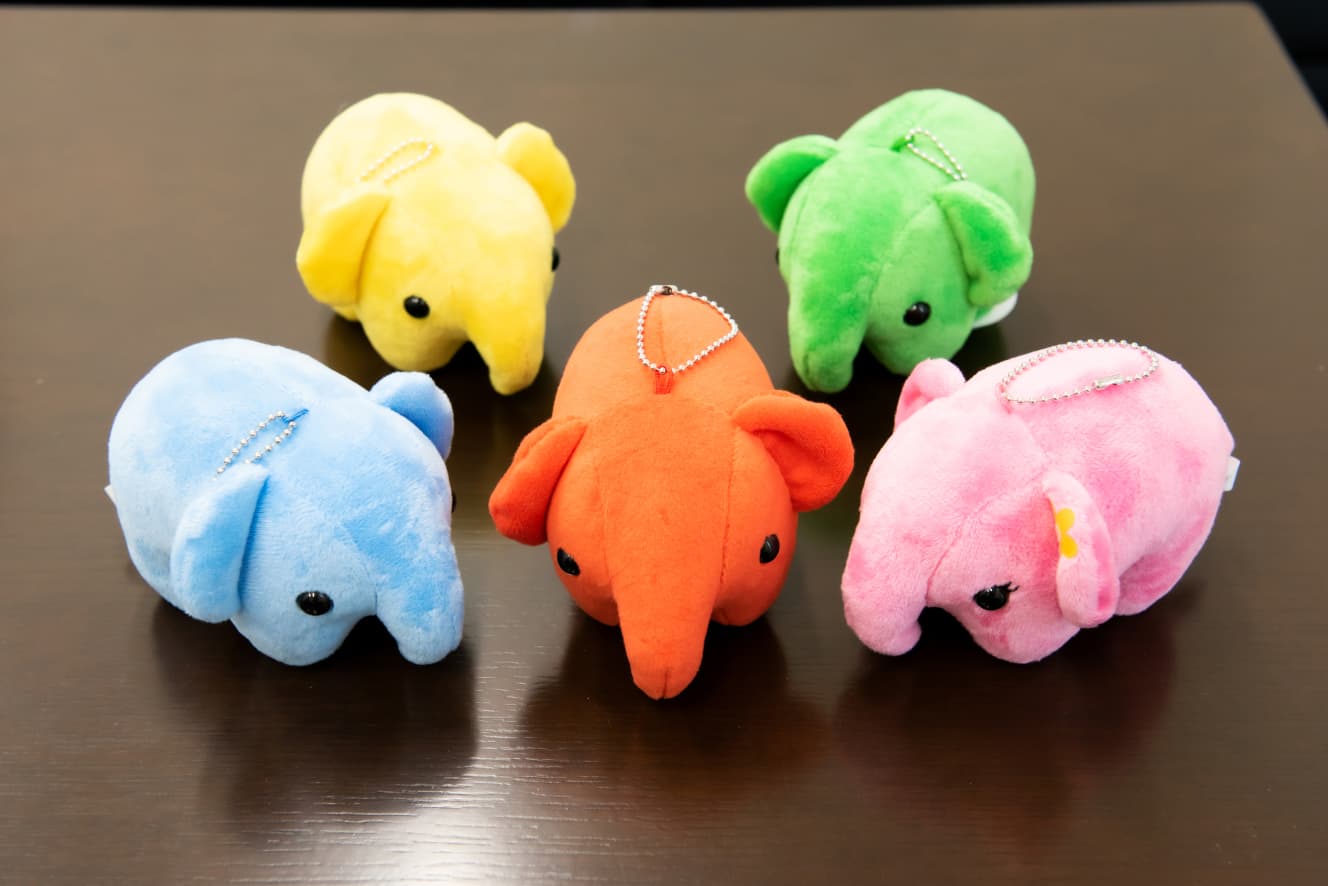Surprising career of the female president of Dom Dom Burger
Former Job: Izakaya Proprietress!
Before I joined Dom Dom Dom Hamburger, I ran an izakaya in Shinbashi,” says Shinobu Fujisaki, president of Dom Dom Dom Hamburger.
I joined Domdom Hamburger in 2017, and nine months later became president.
He joined the company in 2017, and nine months later became president, selling a succession of innovative products never before seen, such as the “Marugoto Crab Burger” with a whole soft-shell crab on top, and the “Jee Pai Burger” with a giant fried fish called “Jee Pai” popular at Taiwanese food stalls. The company has been selling a succession of novel and never-before-seen products. While the restaurant business was struggling due to the COVID-19 crisis, the company opened the “Dom Dom Hamburger PLUS Ginza Store” in Ginza in July and the “Aeon Kaihama Makuhari Store” in August. The number of stores, which had only been decreasing, has increased, and the company’s performance, which had been in the red, is now in the black. It is truly a V-shaped recovery.
At its peak, the company had nearly 400 stores, but as more and more burger chains opened new stores, the number of stores dropped to less than 30, and the company was even called an “endangered species” in the hamburger industry.
But he has not stopped his rapid ascent. What is even more surprising is that she was a store manager at Shibuya 109 before that.



From manager of 109 to izakaya proprietress
It was 17 years ago that Ms. Fujisaki became the manager of 109. Ms. Fujisaki was 39 years old. Her husband collapsed, and she had to go back to work.
When I was wondering what to do, a friend’s mother introduced me to a friend of hers.
That was the store in 109. But those were the heyday of the “gyaru” (young, trendy gal) era. Did she feel any resistance to working there? Moreover, Ms. Fujisaki had never had a job before.
She had no idea how to use Excel, and she didn’t know that the number of customers per hour and sales figures could be obtained by operating the cash register. I had to tally the numbers manually (laughs).
Although he was such an amateur store manager, he accumulated all the things he noticed one by one, such as “the curtains in the fitting room were dirty, so I bought some fabric and sewed them myself,” and “I bought some gal magazines and studied fashion,” and as a result, annual sales doubled in five years. However, a change in management policy made it impossible for him to stay at the store.
At that time, Mr. Fujisaki had a dream. He wanted to start his own business and open a store in 109.
But I needed to make preparations and earn a living until then.
When I thought about what I could do, I decided on cooking. I thought I could work at an izakaya even if I didn’t have a cooking license, so I decided to work part-time at an izakaya.
Since I would be working at night, I wanted a safe and secure place. Shimbashi is a sacred place for businessmen, and I thought it would be safe and secure, so I started working at an izakaya in Shimbashi.
Even though he wanted to open a restaurant in 109, there was a line of applicants, and he did not know when he would be able to open a restaurant. In the meantime, he found a vacant store nearby and decided to start an izakaya there. What a dynamic!
No, it was just a matter of urgency. My son was attending a private junior high school at the time, and my husband had a stroke just before he quit 109. He was also blind from diabetes and deaf in one ear. He was even certified as physically disabled.
I was 44 years old and with no skills of any kind, I could not get a job and not get paid that much. Starting a business was the best way for me to make a living.
Even so, opening a restaurant requires funds. In fact, Mrs. Fujisaki’s husband was a politician until he collapsed. You might think, “Oh, so that’s why he had money.
But I would say, “No, not at all. Many people think so, but that is not true at all. At the time, my family’s business was in a difficult situation, and I couldn’t count on any support from my parents. We were really in dire straits.
The funds to open the restaurant came from his retirement allowance from when he was 109 years old. He also wrote a business plan and raised funds with a guarantee from the Credit Guarantee Association.
But running an izakaya is not just about the food. It is also hard work to serve customers. I wonder if her husband didn’t object.
He agreed with me. He thought I could do it. My husband was also a man who liked to go out drinking.
He also gave me advice, saying that I should put a red wiener in the dish and that I should always put potato salad on the table.
He said, “We had a lot of visitors, and we also had a lot of volunteers who would help us out for free during elections. My father was also a politician, and I grew up in that kind of environment, so perhaps I developed good communication skills.
The restaurant became so popular in about a year that you had to make a reservation to get in, and a year and a half later, they opened a second location.

Even if we don’t get the results we expected, it doesn’t mean we failed. You just have to think of the next move.
One of the regulars at the restaurant was a board member of Dom Dom Hamburger. When asked to develop a product, he proposed a thick-baked egg burger, which became a huge hit. This led to his participation in product development as an advisor, and five years ago he was welcomed as an employee.
Just like in a comic book, things went smoothly. However, in addition to her work, Ms. Fujisaki had to take care of her husband. She says she had help from a helper, but it was no small feat to work while caring for her husband. Moreover, in order to propose products, she needed to know the clientele and the atmosphere of the store, so she went out to inspect the store on her days off and submitted reports. In Kanto, he drove himself. Kansai was also a one-day trip.
When I went to visit stores in Kansai, I had my travel expenses paid, so I knew I had to do the right thing.”
Still, why did he switch from running a successful izakaya (Japanese-style pub) business to a hamburger chain, which is even considered an endangered species?
At the time, a group company of Rembrandt Holdings, which is involved in hotel management and corporate revitalization, took over Dom Dom Hamburgers, and I could sense their enthusiasm for rebuilding the business. In addition, two years before I received the invitation, my husband had passed away and my son had entered the workforce. I was able to be light on my feet and take on new challenges.
From store manager to supervisor of the eastern Japan area. It was nine months after he joined the company that he became president.
Since then, he has been involved in the development of new products, the sale of goods featuring the “Domuso-kun” character, and the opening of new events, and has become a hot topic on SNS. He has also been inundated with requests to give lectures.
We are just now getting to the point where we are a normal company,” he said.
I’m sure you had a lot of hardships and made some mistakes to get to this point.
I don’t have that kind of feeling. I think there are hardships in everything we do, but I don’t see them as hardships. I think of it as a process of development.
I don’t think of it as failure. For example, if I wanted to sell 100 units of a new product and only sold 80, most people would consider that a failure, but I don’t. Instead, I think, “What could I have done differently to sell 110 units? So, even if I don’t get the results I expected, it is not a failure.
It is this kind of thinking that has made the company’s rapid progress possible. He has never heard the phrase “unprecedented” used to describe his business.
He is not bound by precedents, which is probably why he introduces new products every month for a limited time, such as the “Gee Pie Burger” and the “Goya Chanpuru Burger,” which no other company has come up with. The only two people who come up with such new products are the product development staff.
The number of people in charge of product development has increased, and if we incorporate the opinions of many different people, we will not be able to come up with a sharp product,” he says. That’s why it’s just the two of us.
Fujisaki says he enjoyed working at 109 and at the izakaya, and he is looking forward to taking on more challenges.
I want to continue to challenge myself in many different ways. I hope we can become the one and only hamburger chain for our customers.

Interview and text by: Izumi Nakagawa Photographed by: Ayumi Kakami